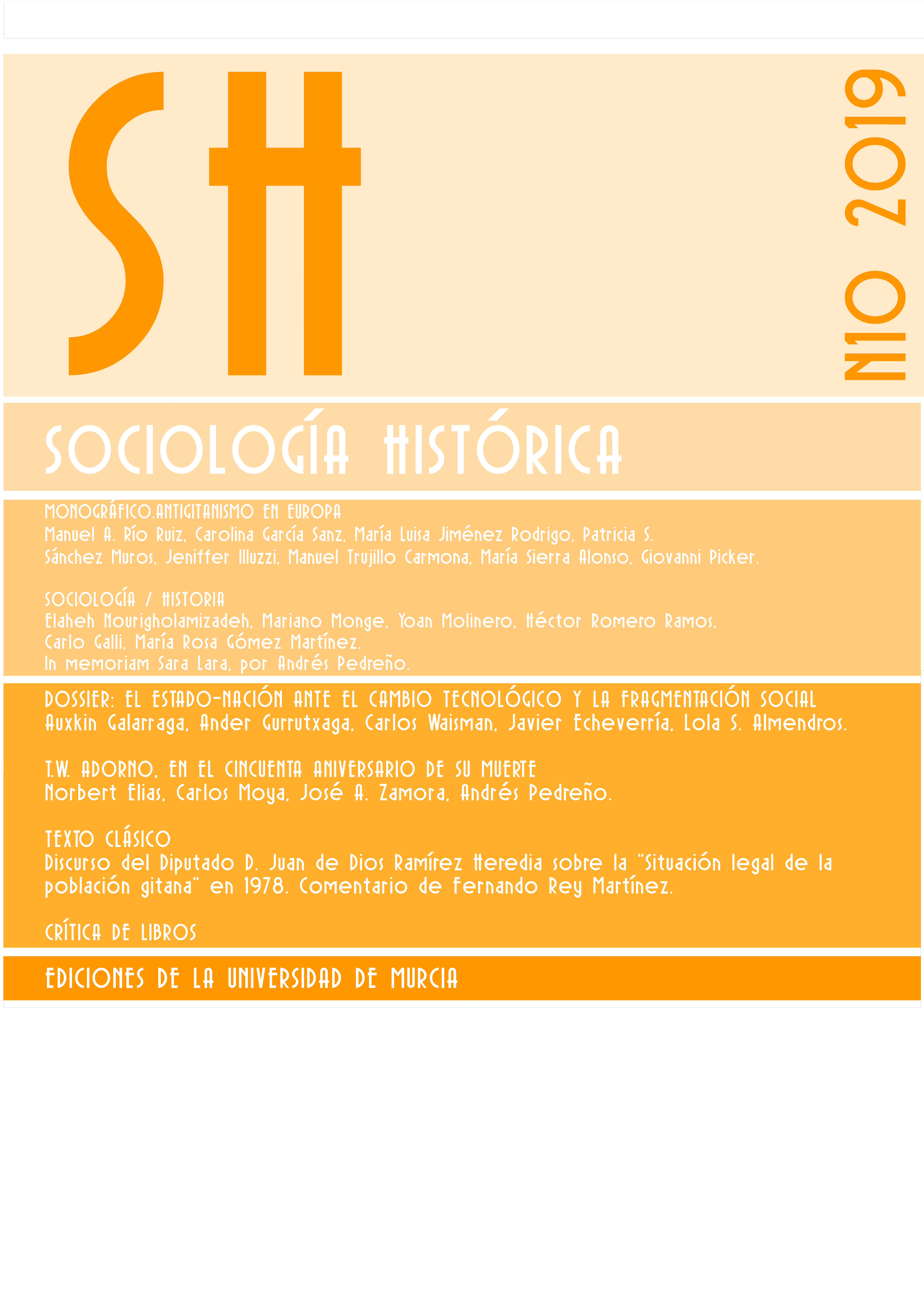Techno-States, infosphere and technopolitics How to hack the clouds?
Abstract
Our way of life is going through a process of informatization that redefines practices and power relations. In this transformation, the State and traditional activism have lost their capacity to act and, thus, their power. To realize this situation, and to be able to develop new modes of resistance, it is necessary to understand how power relations are being configured: what politics is and how it is done today.
Luciano Floridi's philosophy of information offers a good conceptual framework to characterize this new way of life. But he considers the process of computerization as an ontological issue, which leads to an informational ecosystem vision as neutral environment. This hinders the critical capacity in a way of life whose logic is symbiotic and compromises freedom. Our intention is to complete his analysis from an axiological and political perspective, in order to characterize a set of conditions for the development of effective political resistance in the informational age.
Downloads
-
Abstract541
-
pdf (Español (España))629
References
AGHION, P. y BANERJEE, A. (2005): Volatility and Growth, Oxford (UK), Oxford University Press.
CALDERINI, M., GARRONE, P. y SOBRERO, M. (2003): Corporate Governance, Market Structure and Innovation, Cheltenham (UK), Edwar Elgar.
ECHEVERRÍA, J. (1999): Los señores del aire: Telépolis y el tercer entorno, Barcelona, Destino.
FLORIDI, L. (2007): “A Look into the Future Impact of ITC on Our Live”, The Information Society, 23, 1, pp. 59-64. Consultado: 20 de septiembre 2018 (https://doi.org/10.1080/01972240601059094).
FLORIDI, L. (2009a): “Against Digital Ontology”, Synthese, 168, pp. 151-178. Consultado: 20 de septiembre 2018 (https://doi.org/10.1007/s1129-008-9334-6).
FLORIDI, L. (2009b): “Network Ethics: Information and Business Ethics in a Networked Society”, Journal of Business Ethics, 90, pp. 649-659. Consultado: 20 de septiembre 2018 (https://doi.org/10.1007/s10551-010-0598-7).
FLORIDI, L. (2010a): Ethics After the Information Revolution , en The Cambridge Handbook of Information and Computer Ethics , editado por L. Floridi, New York, Cambridge University Press, pp. 3-19.
FLORIDI, L. (2010b): The Ethics of the Information Society in a Globalized World, en The Cambridge Handbook of Information and Computer Ethics , editado por L. Floridi, New York, Cambridge University Press, pp. 271-283.
FLORIDI, L. (2010c): Information. A Very Short Introduction , New York, Oxford University Press.
FLORIDI, L. (2011a): “The Informational Nature of Personal Identity”, Mind & Machines , 21, pp. 549-566. Consultado: 20 de septiembre 2018 (https://doi.org/10.1007/s11023-011-9259-6).
FLORIDI, L. (2011b): The Philosophy of Information, New York, Oxford University Press.
FLORIDI, L. (2012): “Turing’s Three Philosophical Lessons and the Philosophy of Information”, Philosophical Transactions of Royal Society A , 370, pp. 3536-3542. Consultado: 20 de septiembre 2018 (https://doi.org/10.1098/rsta.2011.0325).
FLORIDI, L. (2013a): “Distributed Morality in an Information Society”, Science and Engineering Ethics , 19, pp. 727-743. Consultado: 20 de septiembre 2018 (https://doi.org/10.1007/s11948-012-9413-4).
FLORIDI, L. (2013b): The Ethics of Information, Oxford, Oxford University Press.
FLORIDI, L. (2014): The Fourth Revolution. How the Infosphere is Reshaping Human Reality , Oxford, Oxford University Press.
FLORIDI, L. (ed.) (2015): The Onlife Manifesto. Being Human in a Hyperconnected Era. SpringerOpen . Consultado: 20 de septiembre 2018 (https://doi.org/10.1007/978-3-319-04093-6).
FOUCAULT, M. (2000): Vigilar y castigar: el nacimiento de la prisión , México, Siglo XXI.
FOUCAULT, M. (2002): La hermenéutica del sujeto: Curso en el Collège de France (1981-1982), México, Fondo de Cultura Económica.
HAN, B. (2012): La sociedad del cansancio, Barcelona, Herder.
HAN, B. (2013): La sociedad de la transparencia, Barcelona, Herder.
HAN, B. (2014a): En el enjambre, Barcelona, Herder.
HAN, B. (2014b): Psicopolítica. Neoliberalismo y nuevas técnicas de poder, Barcelona, Herder.
HARAWAY, D. (1991): Simians, Cyborgs, and Women. The Reinvention of Nature, New York, Routledge.
MOROZOV, E. (2012): El desengaño de Internet: los mitos de la libertad en la red, Barcelona, Destino.
MOROZOV, E. (2013): To Save Everything, Click Here: The Folly of Technological Solutionism, New York, PublicAffairs.
SCHUMPETER, J. (2003): Capitalism, Socialism and Democracy, New York, Reoutledge.
WINNER, L. (1980): “Do Artifacts Have Politics?”, Daedalus , 109, 1, pp. 121-136. Consultado: 26 de septiembre de 2018 (http://www.jstor.org/stable/20024652).
WINNER, L. (1989): The Whale and the Reactor. A Search for Limits in an Age of Hight Technology , Chicago, University of Chicago Press.

This work is licensed under a Creative Commons Attribution-NonCommercial-NoDerivatives 4.0 International License.
Las obras que se publican en esta revista están sujetas a los siguientes términos:
1. El Servicio de Publicaciones de la Universidad de Murcia (la editorial) conserva los derechos patrimoniales (copyright) de las obras publicadas, y favorece y permite la reutilización de las mismas bajo la licencia de uso indicada en el punto 2.
2. Las obras se publican en la edición electrónica de la revista bajo una licencia Creative Commons Reconocimiento-NoComercial-SinObraDerivada 4.0 España (texto legal). Se pueden copiar, usar, difundir, transmitir y exponer públicamente, siempre que: i) se cite la autoría y la fuente original de su publicación (revista, editorial y URL de la obra); ii) no se usen para fines comerciales; iii) se mencione la existencia y especificaciones de esta licencia de uso.
3. Condiciones de auto-archivo. Se permite y se anima a los autores a difundir electrónicamente las versiones pre-print (versión antes de ser evaluada) y/o post-print (versión evaluada y aceptada para su publicación) de sus obras antes de su publicación, ya que favorece su circulación y difusión más temprana y con ello un posible aumento en su citación y alcance entre la comunidad académica. Color RoMEO: verde.










